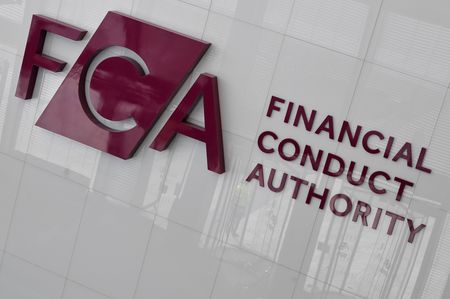LONDON (Reuters) -Britain’s Financial Conduct Authority (FCA) said on Thursday it would roll out stricter rules for electronic payment firms from May 2026 to better safeguard customers’ money.
The regulator, which first laid out proposed reforms for payment firms in September, said companies would be required to keep customer money separate from their own funds, so that it could be returned if the firm fails.
The payments sector has come under greater scrutiny as more consumers have become exposed to the risk of poor safeguarding. Between 2017 and 2022, the use of current accounts with online money and payment institutions – rather than traditional banks – has surged five-fold, a FCA survey shows.
Under the tighter rules, larger payment firms will be subject to monthly reporting and annual audits, and they will be required to conduct daily checks to ensure the right amount of money is being safeguarded to protect customers.
The rules will apply to payment institutions, e-money institutions (EMIs) and credit unions that issue e-money, the regulator said.
EMIs flooded London over the last decade, benefiting from a lighter regulatory burden compared to banks.
Last month foreign exchange broker Argentex, an e-money institution (EMI) since 2018, fell into special administration after succumbing to market volatility following a decline in the company’s liquidity position.
Failed payment firms had average shortfalls of 65% of their customers’ funds over a five-year period to mid-2023, the FCA said.
“People rely on payment firms to help manage their financial lives. But too often, when those firms fail, their customers are left out of pocket,” said Matthew Long, director of payments and digital assets at the FCA.
“We’ll be watching closely to see if firms seize the opportunity and make effective improvements that their customers rightly deserve – this will help us to determine whether any further tightening of rules is necessary.”
UK Finance, a lobby group for the finance industry, said it was important that the new safeguarding rules were assessed for their impact and effectiveness before any further changes were made.
“We support a robust and effective safeguarding regime that protects customers without placing unrealistic demands on businesses, particularly smaller firms,” a spokesperson said.
“Getting the balance right means having rules that are practical, proportionate, and internationally competitive.”
(Reporting by Iain Withers and Kirstin Ridley, Editing by Ed Osmond)









